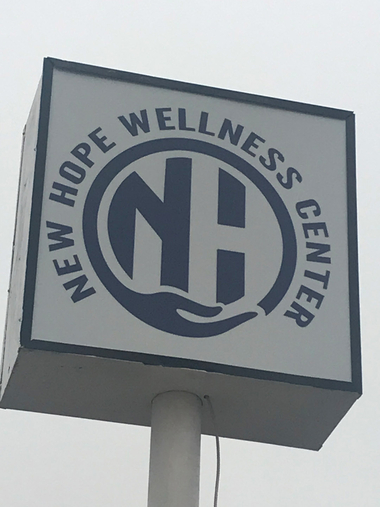A vision of service

by Robin Dorner
Editor in Chief
Theodore Noel founded Guiding Right, Inc. (GRI) 25 years ago primarily to serve the growing needs of the Black Community. He and his staff have done a fantastic job doing just that for these many years.
Now providing ambulatory medical care to the Black Community with their New Hope Wellness Center (NHWC), here is an updated overview of the work of GRI and NHWC.
What programs and services are offered at Guiding Right, Inc. (GRI), and where are your GR clinic locations? Guiding Right, Inc. is headquartered at 1420 NE 23rd St, Oklahoma City, OK 73111, in the heart of the African American community. We also maintain an office inside the Diversity Center at 2242 NW 39th St. in the heart of Oklahoma City’s gay district.
GRI offers an array of public health programs and services, including Women, Infants, and Childrens (WIC), Tobacco Control, Food Pantry & Nutrition, Research, Transportation Condoms and safer sex kits, Mental Health, HIV+ Support Groups, Counseling and Therapy, linguistically and culturally sexual health education, Pre-Exposure Prophylaxis (PrEP), and Post-Exposure Prophylaxis (PEP), education and referrals.
In addition, GRI provides the following testing and screenings: Rapid HIV testing, Chlamydia, Gonorrhea, Syphilis, and Hepatitis B & C testing.
How does that goal carry over to NHWC? The clinic, by providing ambulatory medical care to Black/African Americans living with HIV, is the culmination of Guiding Right’s initial call to action of being a bridge to link individuals to medical treatment and care.
New Hope Wellness Center provides ambulatory medical care to Black and Hispanic/Latinx individuals living with HIV in the Western Oklahoma service area. Providers at New Hope go the extra mile to ensure patients stay medicine-compliant by implementing Partnership for Health – Medication Adherence (P4H). P4H is a brief (three-to-five minute), clinic-based, individual-level, provider-administered intervention. The intervention aims to improve adherence to antiretroviral therapy and achieve undetectable viral load. NHWC also includes Pre-Exposure Prophylaxis (PrEP), Post-Exposure Prophylaxis (PEP), HIV case management, transportation and HIV Drug Assistance Program (HDAP).
What programs and services are offered at New Hope Wellness Center (NHWC), and where are your NHWC clinic locations? New Hope Wellness Center is the clinical arm of Guiding Right, Inc. The clinic is at 2809 NW 31st St, Oklahoma City, OK 73112. New Hope Wellness Center provides ambulatory medical care to Black and Hispanic/Latinx individuals living with HIV in the Western Oklahoma service area.
Providers at New Hope go the extra mile to ensure patients stay medicine-compliant by implementing Partnership for Health – Medication Adherence (P4H). P4H is a brief (three-to-five minute), clinic-based, individual-level, provider-administered intervention. The intervention aims to improve adherence to antiretroviral therapy and achieve undetectable viral load. NHWC also includes Pre-Exposure Prophylaxis (PrEP), Post-Exposure Prophylaxis (PEP), HIV case management, transportation and HIV Drug Assistance Program (HDAP).
If someone is looking for a primary care doctor, can NHWC meet that need? Our nurse practitioner, Jennifer Le, MSN, APRN, FNP-C, and our medical director, Dr. Christopher Harris, of Nexus Family and Maternity Care, can care for patients’ primary care needs.
What other services are offered at NHWC that someone can’t get at GR? Testing, treatment, and diagnosis of STI for known exposure/symptomatic patients. PrEP - pre-exposure prophylaxis, PeP - post-exposure prophylaxis, ART - Antiretroviral Therapy, HIV Drug Assistance Program (HDAP), and Sexual Health Exams - Vaginal infections/STI Swabs.
As one of only a few Black health organizations in Oklahoma, what is your biggest challenge in serving your community? While it may sound cliché, community is your Village. I describe my community based on the seven principles of African heritage, Nguzu Saba. One principle in particular, Ujima, collective work and responsibility, guides us to maintain our community together, make our brothers’ and sisters’ problems our problems, and solve them together.
My community comprises generations of ancestors who pass their wisdom and knowledge down to the next generation. Essentially, it is the blended families of relatives and friends working together for one common cause. Our community, the Black/African American community, is so multifaceted. I believe adopting this principle removes any challenge faced by my community.
What is the most gratifying experience you have had doing this work? In my two-and-a-half decades of engaging in this work, pinpointing the most gratifying experience is impossible. Reflecting on my early days of providing HIV testing, a significant transformation stands out.
Back then, individuals faced a minimum one-week wait before receiving their test results, creating an anxious period of uncertainty.
Fast forward to today, and the landscape has shifted dramatically. Technological advancements and streamlined testing processes enable individuals to obtain their HIV test results in just one minute. This remarkable progress alleviates the emotional burden of waiting and facilitates prompt access to support services and medical interventions if needed.
Witnessing such positive changes in testing procedures over the years underscores the evolving landscape of healthcare and the continuous efforts to enhance accessibility and efficiency in addressing public health challenges like HIV/AIDS.
Is there anything you would like to add? Organizations and individuals should not continue the ineffective practices of times past and expect to effect change in Ending the HIV Epidemic (EHE). It will take the strength, expertise, cohesiveness and collaboration of multiple sectors, including community, policymakers, industry, federal and state-level agencies working together to achieve the goals outlined in EHE of reaching a 75 percent reduction in new HIV infections by 2025 and at least 90 percent reduction by 2030.
The Gayly 02/05/24 @5:04 p.m. CST





